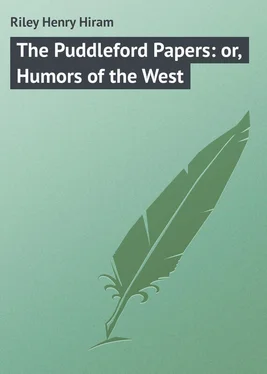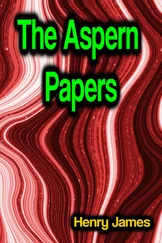Henry Riley - The Puddleford Papers - or, Humors of the West
Здесь есть возможность читать онлайн «Henry Riley - The Puddleford Papers - or, Humors of the West» — ознакомительный отрывок электронной книги совершенно бесплатно, а после прочтения отрывка купить полную версию. В некоторых случаях можно слушать аудио, скачать через торрент в формате fb2 и присутствует краткое содержание. Жанр: foreign_prose, foreign_humor, на английском языке. Описание произведения, (предисловие) а так же отзывы посетителей доступны на портале библиотеки ЛибКат.
- Название:The Puddleford Papers: or, Humors of the West
- Автор:
- Жанр:
- Год:неизвестен
- ISBN:нет данных
- Рейтинг книги:3 / 5. Голосов: 1
-
Избранное:Добавить в избранное
- Отзывы:
-
Ваша оценка:
- 60
- 1
- 2
- 3
- 4
- 5
The Puddleford Papers: or, Humors of the West: краткое содержание, описание и аннотация
Предлагаем к чтению аннотацию, описание, краткое содержание или предисловие (зависит от того, что написал сам автор книги «The Puddleford Papers: or, Humors of the West»). Если вы не нашли необходимую информацию о книге — напишите в комментариях, мы постараемся отыскать её.
The Puddleford Papers: or, Humors of the West — читать онлайн ознакомительный отрывок
Ниже представлен текст книги, разбитый по страницам. Система сохранения места последней прочитанной страницы, позволяет с удобством читать онлайн бесплатно книгу «The Puddleford Papers: or, Humors of the West», без необходимости каждый раз заново искать на чём Вы остановились. Поставьте закладку, и сможете в любой момент перейти на страницу, на которой закончили чтение.
Интервал:
Закладка:
This, of course, was a demonstration. Venison and myself followed up again, and, sure enough, we "had 'em," as he predicted. There they were, roaring in the top of a great oak, like thunder, coming in and going out, wheeling up and down through the air as though some great celebration was going on. It seemed that the whole hive of workers must have broken forth to capture and carry away Venison's honey-box.
"Will they sting?" inquired I.
"Some folks say they will," he replied. "If they hate a man they'll follow him a mile; and nobody knows who they hate and who they don't, until they're tried."
"Where's the honey?" I inquired again.
"Well, that's the next thing I'm arter;" and Venison put his ear to the trunk of the tree to ascertain in what part of it they were "a-workin'." He listened a while, but "they warn't low down, he know'd, for he didn't hear 'em hummin'." He thought the honey was "out the way, high up somewhere." So at the tree he went with his axe, and in half an hour the old oak – older, probably, than any man on the globe – came down with a crash that roused up all the echoes of the wilderness.
Upon an examination, the honey was, probably, Venison thought, packed away in a hollow of the tree, about fifty feet from the ground, as a large knot-hole was discerned, out of which the bees were streaming in great consternation. So he severed the trunk again, at the bottom of the hollow, and there it was, great flakes piled one upon another, some of which had been broken by the fall of the tree, and were dripping and oozing out their wild richness.
"That's the raal stuff," exclaimed Venison; "something 'sides bees-bread."
Venison had brought nothing with him to hold his honey, and I was a little curious to know how he would manage. He cut the tree again above the knot. During his labor the bees had settled all over him. His hands, face, and hair were filled, besides a circle of them that were angrily wheeling about his head. But he heeded them not, except by an occasional shake, which was significant of pity rather than rage.
"Now," said Venison, when his work was finished, the tree cut, the knot-hole stopped, and the whole turned upside down, "that's what I call a nat'ral bee-hive, and we'll just stuff in a little dry grass on the top, and then I'll be ready to move."
"Move!" I exclaimed, "move! You don't expect ue will carry home a tree , do you?"
"Two or three on 'em, I s'pect. Venison allers gets as much as that."
Venison was right. Before noon, half a dozen hives were captured and ready for removal. I confess, after the excitement was over, that I began to grow quite serious over my forenoon's labor. I sat down to rest myself, and the very solemnity of the wilderness produced a sober train of thought. A south-west breeze sprang up loaded with the dying breath of the fall-flowers. It was blowing down the leaves around me, and piling them up in gorgeous drifts. Like an undertaker around the remains of the dead, it was quietly tearing down the drapery, and preparing the year for its burial. A haze overspread everything, and the distance was mellow, the objects indistinct, and the whole landscape seemed swimming, as we sometimes see it in a dream. The trees were covered with haze; and a canoe, on its way down, appeared to be hung up in the air; the birds were hazy; and, looking about me, I appeared to be sitting in a great tent of haze. The squirrels were clattering through the trees, and throwing down the nuts; the partridges were drumming; the rabbits rustling through the dry leaves; the water-fowl hurrying through the air; and the crickets, those melancholy musicians, were piping a low, dirge-like strain to the golden hours of autumn as they passed away.
I thought I could hear the great heart of Nature beat with measured and palpitating strokes; could feel the pendulum of Time swinging back and forth.
But I said I was rather sober. There stood our six bee-hives, and clinging to each in large clusters were its inhabitants, who had been driven forth by us to brave a pitiless winter. We had destroyed six cities, and banished their people; six cities, six governments of law and order. Cities laid out in lanes, and streets, and squares; cities of dwelling-houses and castles; cities filled with all sorts of people; all castes in society. There were the queen and her palace; the drones and their castles; and the serf, or day-laborer, and his hut; and there, sitting upon her throne, the sovereign swayed as mighty a sceptre, tyrannized over as great a people, in her opinion, as any human despot. She undoubtedly bustled about, talked large, swelled up herself with her importance, boasted of her blood, of her divine right to rule (certainly divine in her case), just as all earthly princes do. There she projected plans of war, marshalled her forces, and stimulated their courage with inflammatory appeals. She talked about her house as the royal line, as the French used to about the Bourbons. And then a lazy aristocracy had been broken up by us; we had turned hundreds of drones adrift, and according to the modern definition, drones must be aristocrats; that is, they did no work, and lived upon the labor of others. They were, in all probability, just like all other aristocratic drones. They lounged about the hive in each other's company; had an occasional uproar at each other's table; turned out to take the morning air, and slept after dinner. They probably advised in all matters of public policy, and cried every day, "Long live the Queen." I did not care much about the drones, however. But we had turned the poor day-laborer out of doors; he who rose with the sun, and went forth to work while the dew was yet tying on the flowers. We had humbled the pride of six cities, and brought it to the dust. Is it strange that I felt sober?
But Venison broke my musing by informing me that it was "about time to cakalate a little about getting our honey home, and he guessed he'd go and rig up a raft, and float the cargo down."
And soon a raft was constructed of flood-wood, and bound together with green withes, the honey rolled aboard, two long poles prepared to be used to guide the craft, and away we glided, followed by a long train of bees, who had been despoiled, and who streamed along after us, until the shadows of evening arrested their flight, and parted them and their treasure forever.
CHAPTER IV
The Log-Chapel. – Father Beals. – Aunt Graves. – Sister Abigail. – Bigelow Van Slyck, the Preacher. – His Entrée. – How he worked. – One of his Sermons. – Performance of the Choir. – "Coronation" achieved. – Getting into Position. – Personal Appeals. – Effect on the Congregation. – Sabbath in the Wilderness. – Is Bigelow the only Ridiculous Preacher?
Puddleford was not altogether a wilderness, although it was located near a wilderness. It was located just on the outskirts of civilization, and, like Venison Styles, it caught a reflection of civilized life from the east, and of savage life from the west. It was an organized township, and was a part of an organized county. There were hundreds and thousands of men who were busy at work all over this county, cutting down the trees and breaking up the soil. Law and religion had found their way among them, just as they always accompany the American pioneer. It could not be otherwise; because these obligations grow up and weave themselves into the very nature of the people of our republic. They are written on the soul. So that judicial circuits, a court-house and jail, Methodist circuits and circuit-riders, and meeting-houses, were established. All this was rough, like the country itself.
Few persons have ever attempted to define the piety of just such a community as this; and yet it has a form, tone, and character peculiarly its own. The portraits of the Puddlefordians were just as clearly reproduced in their religion, as if they had been drawn by sunlight.
Читать дальшеИнтервал:
Закладка:
Похожие книги на «The Puddleford Papers: or, Humors of the West»
Представляем Вашему вниманию похожие книги на «The Puddleford Papers: or, Humors of the West» списком для выбора. Мы отобрали схожую по названию и смыслу литературу в надежде предоставить читателям больше вариантов отыскать новые, интересные, ещё непрочитанные произведения.
Обсуждение, отзывы о книге «The Puddleford Papers: or, Humors of the West» и просто собственные мнения читателей. Оставьте ваши комментарии, напишите, что Вы думаете о произведении, его смысле или главных героях. Укажите что конкретно понравилось, а что нет, и почему Вы так считаете.












![O. Henry - Heart of the West [Annotated]](/books/745888/o-henry-heart-of-the-west-annotated-thumb.webp)